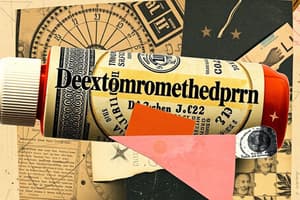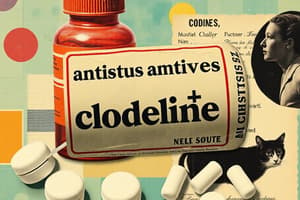Podcast
Questions and Answers
When giving dextromethorphan, the nurse understands that this drug suppresses the cough reflex by which mechanism of action?
When giving dextromethorphan, the nurse understands that this drug suppresses the cough reflex by which mechanism of action?
- Causing depression of the central nervous system
- Anesthetizing the stretch receptors
- Having direct action on the cough center (correct)
- Decreasing the viscosity of the bronchial secretions
During a routine checkup, a patient states that she is unable to take the prescribed antihistamine because of one of its most common adverse effects. The nurse suspects that which adverse effect has been bothering this patient?
During a routine checkup, a patient states that she is unable to take the prescribed antihistamine because of one of its most common adverse effects. The nurse suspects that which adverse effect has been bothering this patient?
- Constipation
- Abdominal cramps
- Drowsiness (correct)
- Decreased libido
A gardener needs a decongestant because of sinus problems and asks the nurse whether he should take an oral form or a nasal spray. Which of these is a benefit of orally administered decongestants?
A gardener needs a decongestant because of sinus problems and asks the nurse whether he should take an oral form or a nasal spray. Which of these is a benefit of orally administered decongestants?
- Immediate onset
- A more potent effect
- Lack of rebound congestion (correct)
- Shorter duration
A patient is taking guaifenesin as part of treatment for a sinus infection. Which instruction will the nurse include during patient teaching?
A patient is taking guaifenesin as part of treatment for a sinus infection. Which instruction will the nurse include during patient teaching?
The nurse will instruct patients about a possible systemic effect that may occur if excessive amounts of topically applied adrenergic nasal decongestants are used. Which systemic effect may occur?
The nurse will instruct patients about a possible systemic effect that may occur if excessive amounts of topically applied adrenergic nasal decongestants are used. Which systemic effect may occur?
A patient with a tracheostomy has difficulty removing excessive, thick mucus from the respiratory tract. The nurse expects that which drug will be ordered to aid in the removal of mucus?
A patient with a tracheostomy has difficulty removing excessive, thick mucus from the respiratory tract. The nurse expects that which drug will be ordered to aid in the removal of mucus?
A patient has been advised to add an adrenergic decongestant nasal spray to treat a cold. The nurse will include which instruction?
A patient has been advised to add an adrenergic decongestant nasal spray to treat a cold. The nurse will include which instruction?
A patient asks the nurse about the uses of the herbal product echinacea. Which use will the nurse include in the response?
A patient asks the nurse about the uses of the herbal product echinacea. Which use will the nurse include in the response?
When teaching a patient who will be receiving antihistamines, the nurse will include which instructions? (Select all that apply.)
When teaching a patient who will be receiving antihistamines, the nurse will include which instructions? (Select all that apply.)
A patient tells the nurse that she wants to start taking the herbal product goldenseal to improve her health. The nurse will assess for which potential cautions or contraindications to goldenseal? (Select all that apply.)
A patient tells the nurse that she wants to start taking the herbal product goldenseal to improve her health. The nurse will assess for which potential cautions or contraindications to goldenseal? (Select all that apply.)
When reviewing the allergy history of a patient, the nurse notes that the patient is allergic to penicillin. Based on this finding, the nurse would question an order for which class of antibiotics?
When reviewing the allergy history of a patient, the nurse notes that the patient is allergic to penicillin. Based on this finding, the nurse would question an order for which class of antibiotics?
The nurse is providing teaching to a patient taking an oral tetracycline antibiotic. Which statement by the nurse is correct?
The nurse is providing teaching to a patient taking an oral tetracycline antibiotic. Which statement by the nurse is correct?
When reviewing the medication orders for a patient who is taking penicillin, the nurse notes that the patient is also taking the oral anticoagulant warfarin. What possible effect may occur as the result of an interaction between these drugs?
When reviewing the medication orders for a patient who is taking penicillin, the nurse notes that the patient is also taking the oral anticoagulant warfarin. What possible effect may occur as the result of an interaction between these drugs?
A patient is receiving his third intravenous dose of a penicillin drug. He calls the nurse to report that he is feeling “anxious” and is having trouble breathing. What will the nurse do first?
A patient is receiving his third intravenous dose of a penicillin drug. He calls the nurse to report that he is feeling “anxious” and is having trouble breathing. What will the nurse do first?
A patient is admitted with a fever of 102.8°F (39.3°C), origin unknown. Assessment reveals cloudy, foul-smelling urine that is dark amber in color. Orders have just been written to obtain stat urine and blood cultures and to administer an antibiotic intravenously. The nurse will complete these orders in which sequence?
A patient is admitted with a fever of 102.8°F (39.3°C), origin unknown. Assessment reveals cloudy, foul-smelling urine that is dark amber in color. Orders have just been written to obtain stat urine and blood cultures and to administer an antibiotic intravenously. The nurse will complete these orders in which sequence?
A patient tells the nurse that he is having nausea and decreased appetite during drug therapy with a tetracycline antibiotic. Which statement is the nurse’s best advice to the patient?
A patient tells the nurse that he is having nausea and decreased appetite during drug therapy with a tetracycline antibiotic. Which statement is the nurse’s best advice to the patient?
The nurse is monitoring a patient who has been on antibiotic therapy for 2 weeks. Today the patient tells the nurse that he has had watery diarrhea since the day before and is having abdominal cramps. His oral temperature is 101°F (38.3°C). Based on these findings, which conclusion will the nurse draw?
The nurse is monitoring a patient who has been on antibiotic therapy for 2 weeks. Today the patient tells the nurse that he has had watery diarrhea since the day before and is having abdominal cramps. His oral temperature is 101°F (38.3°C). Based on these findings, which conclusion will the nurse draw?
The nurse is monitoring for therapeutic results of antibiotic therapy in a patient with an infection. Which laboratory value would indicate therapeutic effectiveness of this therapy?
The nurse is monitoring for therapeutic results of antibiotic therapy in a patient with an infection. Which laboratory value would indicate therapeutic effectiveness of this therapy?
The nurse is reviewing the culture results of a patient with an infection, and notes that the culture indicates a gram-positive organism. Which generation of cephalosporin is most appropriate for this type of infection?
The nurse is reviewing the culture results of a patient with an infection, and notes that the culture indicates a gram-positive organism. Which generation of cephalosporin is most appropriate for this type of infection?
A patient will be having oral surgery and has received an antibiotic to take for 1 week before the surgery. The nurse knows that this is an example of which type of therapy?
A patient will be having oral surgery and has received an antibiotic to take for 1 week before the surgery. The nurse knows that this is an example of which type of therapy?
A patient has a urinary tract infection. The nurse knows that which class of drugs is especially useful for such infections?
A patient has a urinary tract infection. The nurse knows that which class of drugs is especially useful for such infections?
During drug therapy for pneumonia, a female patient develops a vaginal superinfection. The nurse explains that this infection is caused by which of these?
During drug therapy for pneumonia, a female patient develops a vaginal superinfection. The nurse explains that this infection is caused by which of these?
The nurse is preparing to use an antiseptic. Which statement is correct regarding how antiseptics differ from disinfectants?
The nurse is preparing to use an antiseptic. Which statement is correct regarding how antiseptics differ from disinfectants?
A patient with a long-term intravenous catheter is going home. The nurse knows that if the patient is allergic to seafood, which antiseptic agent is contraindicated?
A patient with a long-term intravenous catheter is going home. The nurse knows that if the patient is allergic to seafood, which antiseptic agent is contraindicated?
During antibiotic therapy, the nurse will monitor closely for signs and symptoms of a hypersensitivity reaction. Which of these assessment findings may be an indication of a hypersensitivity reaction? (Select all that apply.)
During antibiotic therapy, the nurse will monitor closely for signs and symptoms of a hypersensitivity reaction. Which of these assessment findings may be an indication of a hypersensitivity reaction? (Select all that apply.)
The nurse is reviewing the medication history of a patient who will be taking a sulfonamide antibiotic. During sulfonamide therapy, a significant drug interaction may occur with which of these drugs or drug classes? (Select all that apply.)
The nurse is reviewing the medication history of a patient who will be taking a sulfonamide antibiotic. During sulfonamide therapy, a significant drug interaction may occur with which of these drugs or drug classes? (Select all that apply.)
Flashcards
Dextromethorphan MOA
Dextromethorphan MOA
Dextromethorphan directly affects the cough center in the brain to suppress the cough reflex.
Antihistamine adverse effect
Antihistamine adverse effect
Drowsiness is a common side effect of antihistamines.
Oral decongestant benefit
Oral decongestant benefit
Oral decongestants may prevent rebound congestion, a possible side effect of nasal sprays.
Guaifenesin use
Guaifenesin use
Signup and view all the flashcards
Topical decongestant side effect
Topical decongestant side effect
Signup and view all the flashcards
Tracheostomy mucus removal
Tracheostomy mucus removal
Signup and view all the flashcards
Nasal decongestant use limit
Nasal decongestant use limit
Signup and view all the flashcards
Echinacea use
Echinacea use
Signup and view all the flashcards
Antihistamine teaching
Antihistamine teaching
Signup and view all the flashcards
Goldenseal caution
Goldenseal caution
Signup and view all the flashcards



